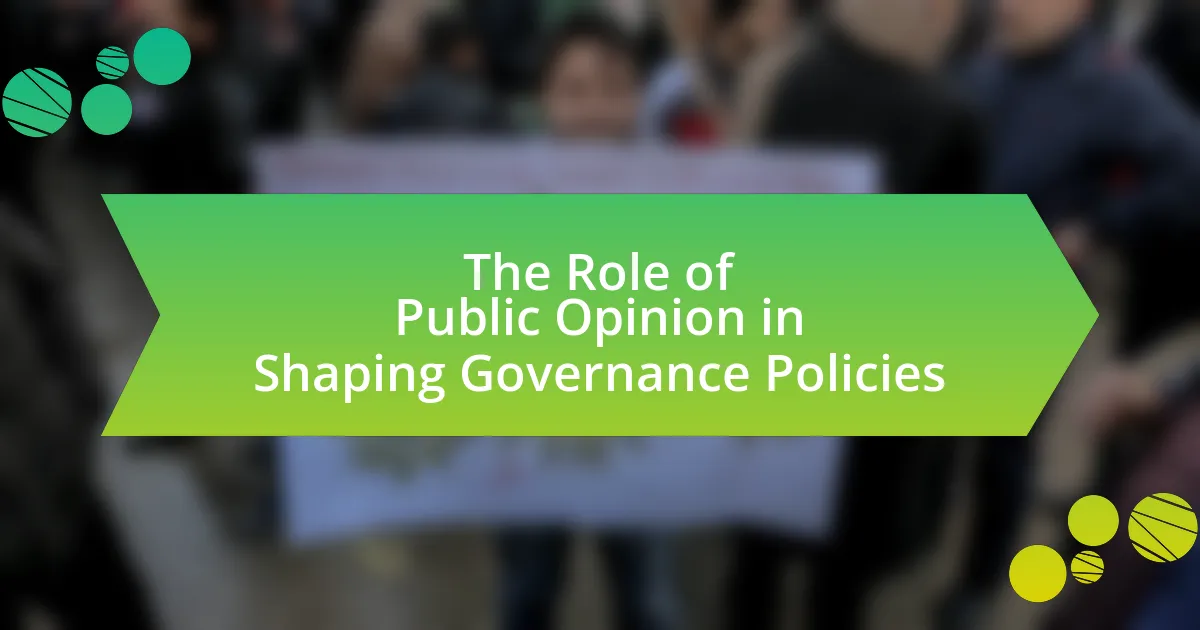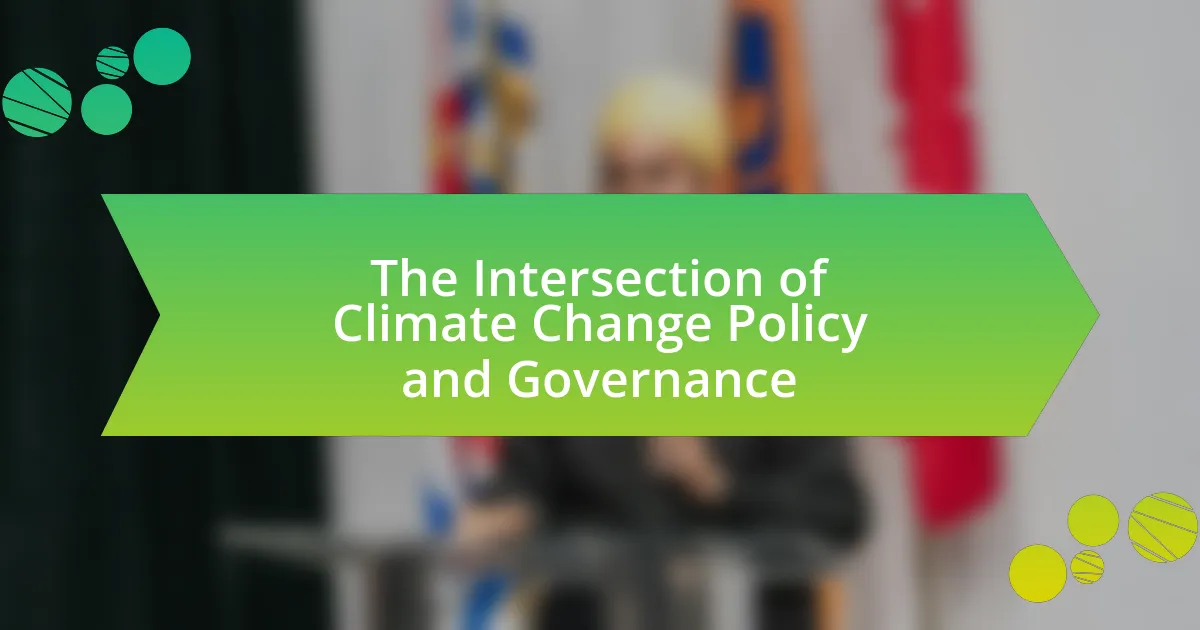International organizations are entities formed by multiple countries to address global challenges and promote cooperation, playing a significant role in national governance. They facilitate diplomatic relations, provide negotiation platforms, and offer technical assistance, thereby enhancing stability, economic development, and adherence to international laws. The article explores how these organizations influence national policies through recommendations, funding, and setting standards, while also examining the mechanisms they use to exert influence, such as diplomacy and economic incentives. Additionally, it discusses the importance of international organizations in promoting democracy, human rights, and economic stability, as well as the challenges they face, including issues of sovereignty and accountability.
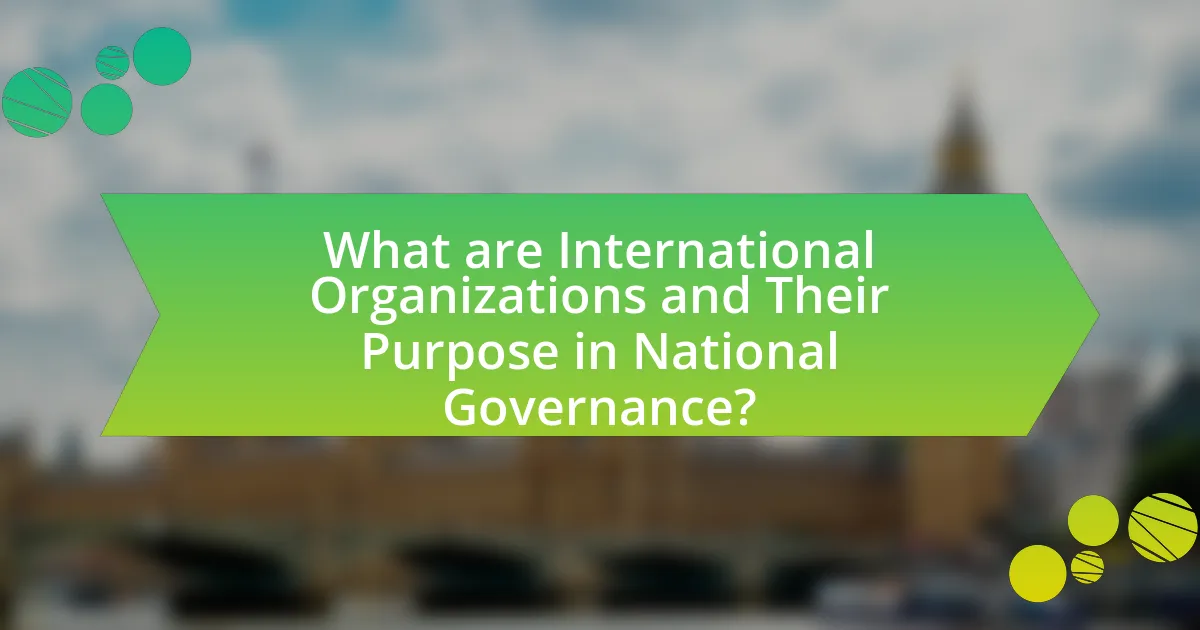
What are International Organizations and Their Purpose in National Governance?
International organizations are entities formed by multiple countries to address common issues and promote cooperation on various global challenges. Their purpose in national governance includes facilitating diplomatic relations, providing platforms for negotiation, and offering technical assistance and resources to member states. For instance, the United Nations plays a crucial role in peacekeeping and humanitarian efforts, while the World Trade Organization regulates international trade to ensure fair practices. These organizations enhance national governance by promoting stability, economic development, and adherence to international laws and standards, thereby contributing to a more interconnected and cooperative global community.
How do International Organizations influence national policies?
International organizations influence national policies primarily through mechanisms such as policy recommendations, funding, and setting international standards. These organizations, including the United Nations and the World Bank, provide expertise and resources that help shape national agendas. For instance, the World Bank’s funding often comes with stipulations that require countries to adopt specific economic reforms, thereby directly impacting national policy decisions. Additionally, international treaties and agreements, such as those facilitated by the World Health Organization, compel nations to align their health policies with global standards, demonstrating the significant sway these organizations hold over domestic governance.
What mechanisms do they use to exert influence?
International organizations exert influence through mechanisms such as diplomacy, economic incentives, and normative frameworks. Diplomacy involves negotiations and dialogue to shape policies and foster cooperation among nations. Economic incentives, including aid and trade agreements, encourage compliance with international standards and practices. Normative frameworks establish guidelines and principles that nations are expected to follow, promoting shared values and behaviors. For example, the United Nations employs these mechanisms to address global issues, influencing member states’ governance through resolutions and treaties that align with international norms.
How do member states respond to these influences?
Member states respond to influences from international organizations by aligning their national policies with international standards and agreements. This alignment often involves adopting legislation that reflects the recommendations or requirements set forth by these organizations, such as the United Nations or the World Trade Organization. For instance, countries may implement reforms in areas like human rights, trade regulations, or environmental policies to comply with international norms, thereby enhancing their global standing and fostering cooperation. This response is evidenced by the fact that many nations have ratified treaties that necessitate changes in domestic law, demonstrating a commitment to international governance frameworks.
Why are International Organizations important for governance?
International organizations are important for governance because they facilitate cooperation among states, promote peace, and establish norms and standards that guide international relations. These organizations, such as the United Nations and the World Trade Organization, provide platforms for dialogue and negotiation, enabling countries to address global challenges collectively. For instance, the United Nations Security Council plays a crucial role in maintaining international peace and security by authorizing interventions and sanctions. Additionally, international organizations help in the formulation of treaties and agreements that govern issues like trade, environmental protection, and human rights, thereby creating a structured framework for international law and accountability.
What roles do they play in promoting democracy and human rights?
International organizations play a crucial role in promoting democracy and human rights by providing frameworks for cooperation, monitoring compliance, and offering support to nations in transition. They facilitate dialogue among member states, establish norms and standards, and provide technical assistance to strengthen democratic institutions. For instance, the United Nations promotes human rights through treaties like the Universal Declaration of Human Rights, which sets global standards for individual freedoms and government accountability. Additionally, organizations such as the Organization for Security and Co-operation in Europe (OSCE) conduct election monitoring to ensure free and fair electoral processes, thereby reinforcing democratic governance. These actions are supported by evidence showing that countries engaged with international organizations tend to have stronger democratic practices and better human rights records.
How do they contribute to economic development and stability?
International organizations contribute to economic development and stability by providing financial assistance, technical expertise, and policy guidance to nations. For example, the International Monetary Fund (IMF) offers loans to countries facing balance of payments problems, which helps stabilize their economies and restore growth. Additionally, organizations like the World Bank fund infrastructure projects that create jobs and improve living standards, directly impacting economic development. According to the World Bank, investments in infrastructure can yield a return of up to 15% in developing countries, demonstrating their significant role in fostering economic stability and growth.
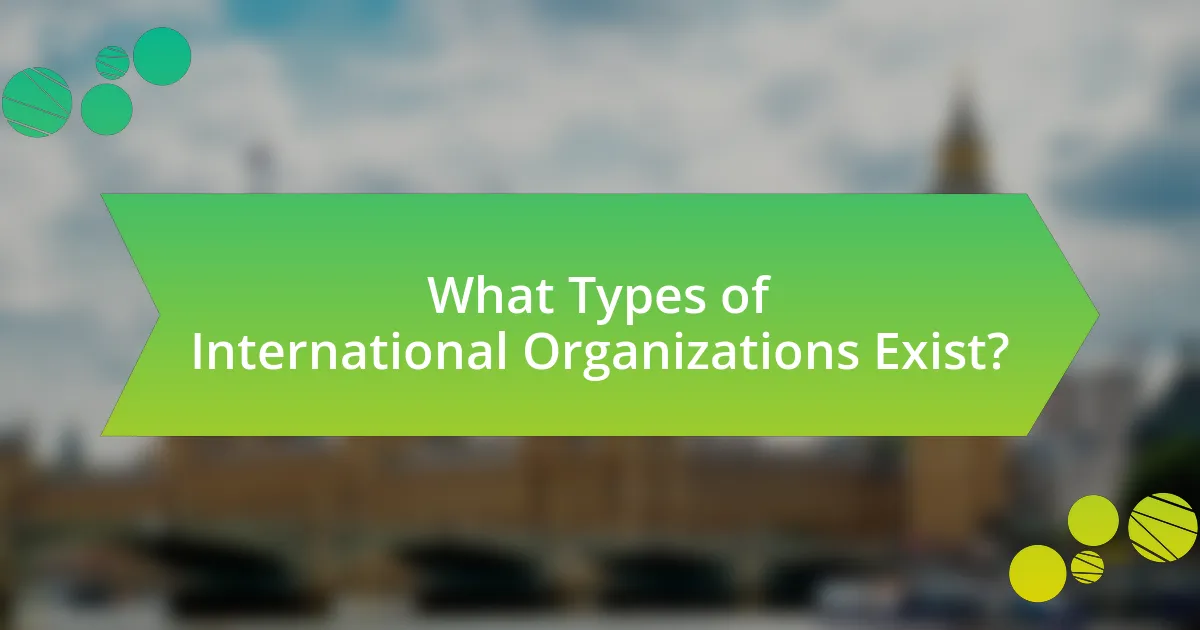
What Types of International Organizations Exist?
International organizations can be categorized into several types, primarily including intergovernmental organizations (IGOs), non-governmental organizations (NGOs), and multinational corporations (MNCs). IGOs, such as the United Nations and the World Trade Organization, are formed by member states to address issues that transcend national borders, facilitating cooperation on matters like security, trade, and environmental protection. NGOs, like Amnesty International and the Red Cross, operate independently of government influence, focusing on humanitarian, environmental, and social issues. MNCs, such as Apple and Toyota, engage in international business and can influence global economic policies and practices. These categories reflect the diverse roles that international organizations play in governance and global affairs.
What are the main categories of International Organizations?
The main categories of International Organizations are intergovernmental organizations (IGOs) and non-governmental organizations (NGOs). IGOs, such as the United Nations and the World Trade Organization, are formed by member states to address issues of mutual concern and facilitate cooperation. NGOs, like Amnesty International and the Red Cross, operate independently of governments and focus on specific social, humanitarian, or environmental issues. These categories are essential for understanding how international entities influence national governance and global policies.
How do intergovernmental organizations differ from non-governmental organizations?
Intergovernmental organizations (IGOs) differ from non-governmental organizations (NGOs) primarily in their membership and purpose. IGOs are composed of member states and are established by treaties or agreements between governments to address issues that transcend national borders, such as security, trade, and environmental concerns; examples include the United Nations and the World Trade Organization. In contrast, NGOs are independent organizations that operate without government affiliation, focusing on specific social, humanitarian, or environmental issues, such as Amnesty International or Greenpeace. The distinction is further highlighted by IGOs having formal authority and responsibilities defined by international law, while NGOs typically rely on voluntary participation and funding to influence policy and advocate for change.
What are some examples of each type?
International organizations can be categorized into three main types: intergovernmental organizations (IGOs), non-governmental organizations (NGOs), and multinational corporations (MNCs). Examples of IGOs include the United Nations, which facilitates international cooperation, and the World Trade Organization, which regulates international trade. NGOs, such as Amnesty International, advocate for human rights and environmental issues, while MNCs like Apple and ExxonMobil influence national economies and policies through their global operations. These examples illustrate the diverse roles that different types of international organizations play in national governance.
How do regional organizations impact national governance?
Regional organizations significantly influence national governance by promoting cooperation, establishing norms, and facilitating policy alignment among member states. These organizations, such as the European Union and the African Union, create frameworks that encourage countries to adopt shared policies and standards, which can lead to enhanced governance practices. For instance, the European Union’s Copenhagen criteria require member states to adhere to democratic principles and rule of law, thereby directly impacting their national governance structures. Additionally, regional organizations often provide financial assistance and technical support to help countries implement reforms, further shaping governance outcomes.
What specific roles do organizations like the EU or AU play?
Organizations like the EU and AU play critical roles in promoting regional integration, political stability, and economic development. The European Union (EU) facilitates economic cooperation among its member states through a single market and customs union, which enhances trade and investment. The African Union (AU) focuses on promoting peace and security across Africa, addressing conflicts, and fostering political unity among African nations. For instance, the EU’s establishment of the Eurozone has led to significant economic interdependence, while the AU’s Peace and Security Council has intervened in various conflicts, such as in Sudan and Somalia, demonstrating its commitment to regional stability.
How do regional agreements affect member states’ sovereignty?
Regional agreements can limit member states’ sovereignty by requiring them to adhere to collective decisions and regulations that may override national laws. For instance, in the European Union, member states must comply with EU regulations and directives, which can restrict their ability to independently legislate on certain issues such as trade, environmental standards, and labor laws. This shift towards shared governance illustrates how regional agreements can create binding obligations that diminish the autonomy of individual states, as seen in the case of the Maastricht Treaty, which established the framework for deeper integration among EU countries.
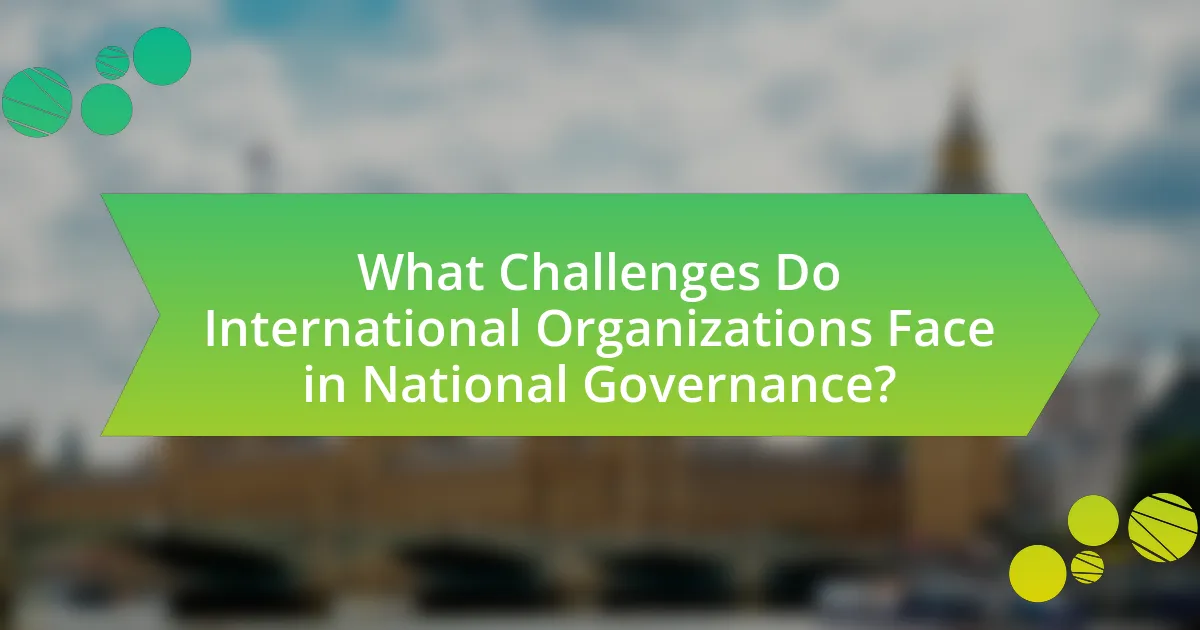
What Challenges Do International Organizations Face in National Governance?
International organizations face significant challenges in national governance, primarily due to issues of sovereignty, political resistance, and varying national interests. Sovereignty concerns arise when international organizations attempt to influence or implement policies that may conflict with a nation’s autonomy, leading to pushback from governments. Political resistance often stems from domestic political dynamics, where local leaders may oppose external intervention to maintain control or appease constituents. Additionally, differing national interests can complicate collaboration, as countries prioritize their own agendas over collective goals, making consensus difficult. For instance, the United Nations often encounters obstacles in peacekeeping missions when host nations are reluctant to cede authority or when geopolitical interests diverge among member states.
What are the common criticisms of International Organizations?
Common criticisms of International Organizations include issues of inefficiency, lack of accountability, and dominance by powerful member states. Inefficiency arises from bureaucratic processes that can delay decision-making and implementation of policies. Lack of accountability is evident when these organizations operate without sufficient oversight, leading to questions about their transparency and responsiveness to member states. Additionally, powerful countries often exert disproportionate influence, which can skew priorities and undermine the interests of smaller or less powerful nations. For instance, the United Nations Security Council’s permanent members have veto power, allowing them to block resolutions that may not align with their national interests, thereby raising concerns about fairness and equity in international governance.
How do issues of accountability and transparency arise?
Issues of accountability and transparency arise primarily from a lack of clear governance structures and oversight mechanisms within organizations. When international organizations operate without defined roles and responsibilities, it leads to ambiguity in decision-making processes, resulting in diminished accountability. For instance, the United Nations has faced criticism for its inability to enforce accountability among member states, particularly in humanitarian interventions, which can lead to a lack of transparency regarding resource allocation and outcomes. Furthermore, inadequate reporting practices and insufficient stakeholder engagement exacerbate these issues, as seen in various audits revealing discrepancies in financial management within international aid programs.
What impact do power dynamics among member states have?
Power dynamics among member states significantly influence decision-making processes within international organizations. These dynamics can lead to unequal representation, where more powerful states dominate discussions and outcomes, often sidelining the interests of smaller or less influential nations. For instance, in the United Nations Security Council, the five permanent members wield veto power, allowing them to block resolutions, which can skew international responses to crises and conflicts. This imbalance can result in policies that reflect the priorities of powerful states rather than a collective agreement, ultimately affecting global governance and cooperation.
How do International Organizations adapt to changing global contexts?
International organizations adapt to changing global contexts by implementing flexible governance structures and responsive policy frameworks. These organizations, such as the United Nations and the World Bank, regularly assess global challenges like climate change, economic crises, and health pandemics, allowing them to adjust their strategies accordingly. For instance, during the COVID-19 pandemic, the World Health Organization rapidly shifted its focus to global health coordination and vaccine distribution, demonstrating its ability to respond to urgent needs. Additionally, international organizations often engage in stakeholder consultations and data analysis to inform their decisions, ensuring that their actions remain relevant and effective in a dynamic global landscape.
What strategies do they employ to remain relevant?
International organizations employ strategies such as adapting to changing global dynamics, fostering partnerships, and enhancing their visibility to remain relevant. By continuously assessing and responding to geopolitical shifts, these organizations can align their missions with current global challenges, such as climate change and public health crises. For instance, the World Health Organization adapted its strategies during the COVID-19 pandemic by prioritizing health emergency responses and global vaccination efforts. Additionally, forming strategic alliances with national governments and other stakeholders allows these organizations to leverage resources and expertise, thereby increasing their impact and relevance in governance.
How do they address emerging global challenges like climate change?
International organizations address emerging global challenges like climate change through collaborative frameworks, policy development, and funding initiatives. For instance, the United Nations Framework Convention on Climate Change (UNFCCC) facilitates international negotiations, leading to agreements such as the Paris Agreement, which aims to limit global warming to well below 2 degrees Celsius. Additionally, organizations like the World Bank provide financial resources and technical assistance to countries for climate adaptation and mitigation projects, supporting efforts to reduce greenhouse gas emissions and enhance resilience to climate impacts. These actions are backed by scientific assessments, such as those from the Intergovernmental Panel on Climate Change (IPCC), which provide critical data and projections that inform policy decisions.
What Best Practices Can Enhance the Role of International Organizations in Governance?
Best practices that can enhance the role of international organizations in governance include fostering collaboration among member states, promoting transparency, and ensuring accountability. Collaboration among member states allows for shared resources and knowledge, which can lead to more effective governance solutions. For instance, the World Health Organization’s coordinated response during the COVID-19 pandemic exemplified how collaboration can enhance global health governance. Transparency in decision-making processes builds trust and encourages participation from various stakeholders, as seen in the United Nations’ open meetings and reports. Lastly, accountability mechanisms, such as independent audits and evaluations, ensure that international organizations remain answerable to their member states and the public, reinforcing their legitimacy and effectiveness in governance.
How can collaboration between organizations and national governments be improved?
Collaboration between organizations and national governments can be improved by establishing clear communication channels and shared objectives. Effective communication fosters transparency and trust, which are essential for successful partnerships. For instance, the United Nations has implemented frameworks that encourage dialogue between member states and various organizations, leading to more coordinated responses to global challenges such as climate change and public health crises. Additionally, joint initiatives, like the Global Fund to Fight AIDS, Tuberculosis and Malaria, demonstrate how collaborative efforts can mobilize resources and expertise effectively. These examples illustrate that structured collaboration mechanisms enhance the synergy between organizations and national governments, ultimately leading to more effective governance.
What role does civil society play in strengthening governance through International Organizations?
Civil society plays a crucial role in strengthening governance through International Organizations by promoting accountability, transparency, and citizen participation. Civil society organizations (CSOs) engage in advocacy, providing a voice for marginalized groups and influencing policy decisions at the international level. For instance, CSOs often participate in the United Nations processes, contributing to the formulation of international norms and standards that enhance governance frameworks in member states. Research by the World Bank indicates that countries with active civil societies tend to have better governance indicators, such as lower corruption levels and higher public trust in institutions. This demonstrates that civil society’s involvement is essential for fostering effective governance through International Organizations.




